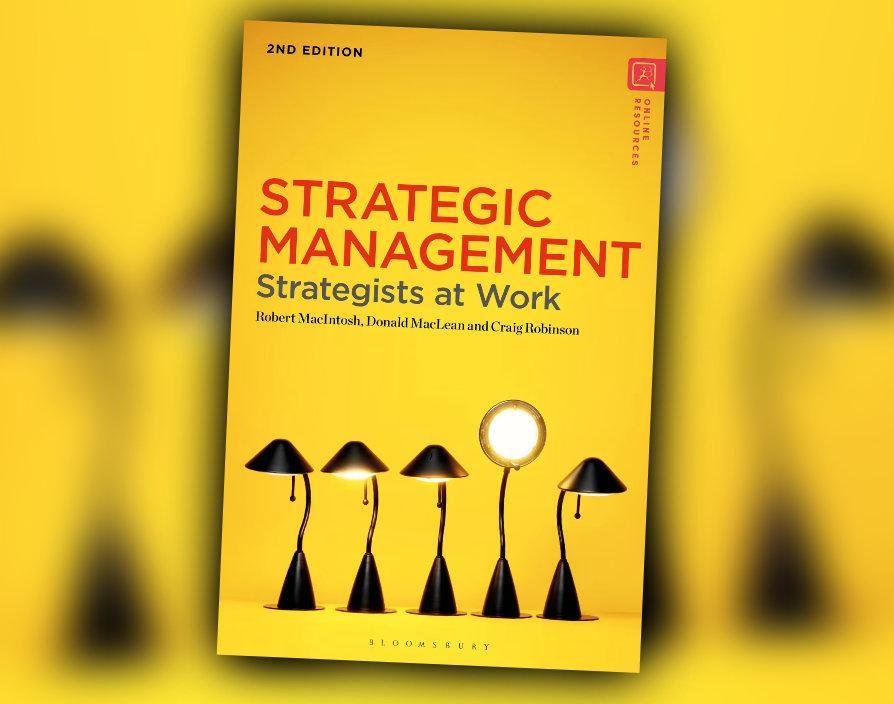“Permacrisis” entered the dictionary as Collins’ Word of the Year for 2022. It’s a concept that rings true for a time where exacerbated and competing challenges dominate our horizon – pandemic, Putin, populism, poverty: never-ending problems, accelerating at pace.
A much needed P to add to the list is positivity, which makes galvanising new ideas with innovative and inspiring strategy all the more necessary.
But as an important new book by academics Robert MacIntosh, Donald MacLean and Craig Robinson makes clear – paying homage to the legendary poet Robbie Burns – even the best laid schemes go awry. The strategic approach they advocate to address this speaks to the stories we tell as entrepreneurs rather than plans put on paper.
‘Rarely in the history of the world have things felt more precarious,’ our authors set the scene within Strategic Management: Strategists At Work, reflecting on the challenging context of the pandemic.
It would be hard to argue otherwise with that analysis. But what has changed in the three years since the first lockdown is the sense that Covid-19 was not, in fact, the story of our lives but the opening chapter to a new epic. A symbolic marker of the moment everything changed. Technology accelerated, globalisation on pause. A new world order.
That sudden, near overnight transition to an almost exclusively digital world saw years of strategy out of the window for many businesses. The same can be said of that moment we all woke up on February 24th last year to the news of Putin’s full-scale invasion of Ukraine. The shift and impact of which was, like the pandemic, sudden and shocking.
Both stand in stark contrast to the slower creep of more existential threats – climate change perhaps most obviously. But also, artificial intelligence, which after decades of Sci-Fi films warning of automation to come, may finally be bearing fruit as AI advances at an unprecedented pace. So much so, even many of its leaders are calling for a pause in progress.
Swift versus creeping change. The challenge that authors MacIntosh, MacLean and Robinson charge businesses with, is how to build a strategy that responds to both. The answer to which, is all in the storytelling.
The result of a successful strategy, they argue, is achieving more than could be reasonably expected. ‘Plans are necessary,’ they say, ‘but they must be created and communicated in ways which foreground narrative, story and symbolism if they are to capture the energy, enthusiasm and commitment of those tasked with enacting the plan.’
In short, the best strategic minds understand that the potential to deliver precisely on any plan is nigh on impossible. It is having agility and resilience in how you respond to failure, as well as challenges both anticipated and unprecedented that matters most. If you can tell a story about how you plan to respond: to your investors, your employees, your customers, then you’re halfway to strategic success.
It’s something my firm, Seven Hills, does, working with entrepreneurs and high growth companies through our MissionLab process to interrogate their purpose and the stories they tell. It is about developing a mission and meaning to drive momentum.
And momentum is crucial in an ever-changing world. Businesses need to give their stakeholders something to cling onto, a mission to believe in and a rallying cry to work towards a collaborative end goal.
Strategic management is therefore far more about how you lead in practice that principle, described artfully by these experienced academic authors as ‘a somewhat bizarre process of creating a plan which seems to galvanize collective action whilst also acknowledging that such plans rarely unfold as intended. Rather, there is an uncomfortable, often quiet process where a seemingly unrelated reality takes shape whilst the original plan is consigned to an ignominious recycling bin.’
The role of business schools can be crucial in bridging the gap between the perception of what strategy is and its reality. It has been said entrepreneurship cannot be learned in a classroom, just as strategy cannot be delivered on paper. But knowing how to harness specific leadership skills and when to deploy them is a learned exercise that only the valuable knowledge of entrepreneurs and business schools combined can do.
A favourite saying I grew up with is that life is what happens when you’re busy making plans. Rapid change is a blink and you miss it moment that requires the full focused attention of entrepreneurs wishing to make a success of an idea. So, if the story of the 2020s is change, then Strategic Management is an insightful and impactful book that tells us that the strategy to surviving this decade – which could well be make or break for our health, geopolitical, environmental and technological security all at once – is about telling your story: advocating the why and how you can be a leader in that change, and not a victim to it.
Share via:








































